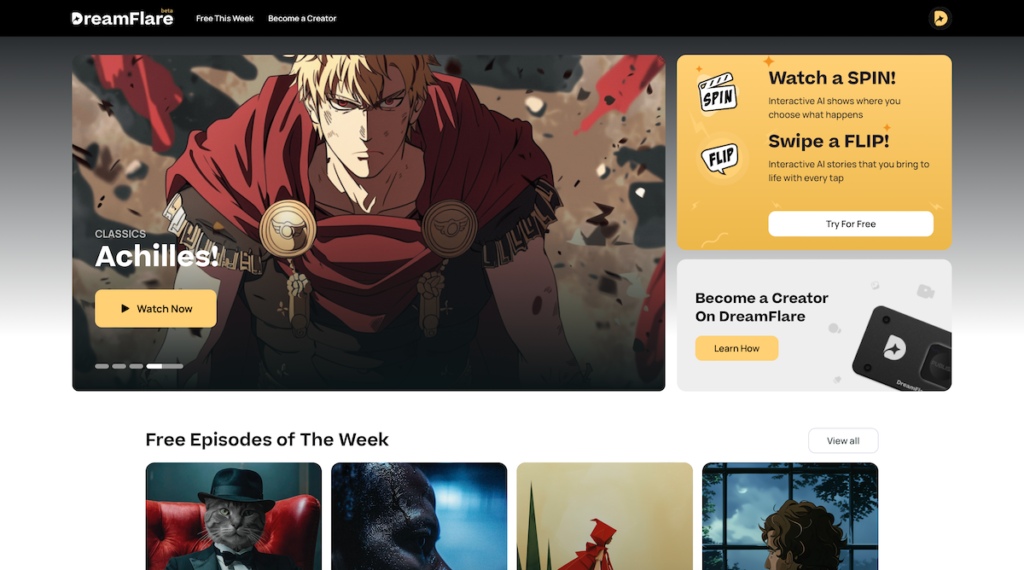
DreamFlare AI, co-founded by former Google employee Josh Liss and documentary filmmaker Rob Bralver, has emerged from stealth mode. The startup aims to assist content creators in making and monetizing short-form AI-generated content. Unlike creating its own AI technology, DreamFlare acts as a studio where creators collaborate with professional storytellers, utilizing third-party AI tools like Runway, Midjourney, and ElevenLabs. The resulting videos will be distributed through a subscription-based online service, allowing creators to earn revenue through subscriptions, advertising, and other options.
DreamFlare’s platform offers two types of animated content:
- Flips: These are comic book-style stories featuring AI-generated short clips and images that users can scroll through.
- Spins: Interactive choose-your-own-adventure short films where viewers can influence certain story outcomes.
Despite concerns about AI’s impact on jobs in Hollywood, DreamFlare emphasizes that it creates a new avenue for creators without replacing existing roles. Josh Liss highlights the opportunity to democratize storytelling and empower human creators with this innovative tool1. The company has already secured investments from FoundersX Ventures and established creative partnerships with industry executives from Disney, Netflix, and Universal1. While some may view AI as a threat, DreamFlare sees it as a catalyst for exciting new narratives1.

DreamFlare, the startup co-founded by former Google employee Josh Liss and documentary filmmaker Rob Bralver, has garnered optimism from investors like FoundersX Ventures. The company boasts creative partnerships with industry executives from Disney, Netflix, and Universal. Additionally, DreamFlare has collaborated with “Oscar and Emmy-winning filmmakers and showrunners,” although their identities remain anonymous due to the ongoing debate surrounding AI-generated content. To date, DreamFlare has secured $1.6 million in funding
How DreamFlare works
DreamFlare, the startup co-founded by former Google employee Josh Liss and documentary filmmaker Rob Bralver, allows creators to utilize existing AI tools with paid plans. However, ethical and legal concerns surround many of these tools. For instance, OpenAI, the company behind the Sora model, does not disclose its training video sources1.
DreamFlare maintains a rigorous review process to ensure submissions avoid copyrighted material and rejects R-rated content. If published content falls short of these standards, the platform issues DMCA takedown notices to address copyright infringement.
Quality, safety, and legality are paramount for DreamFlare. Creators who pass the application process collaborate with the creative team. Interestingly, DreamFlare’s team includes former Disney and Universal executives who remain anonymous.
While content inspired by copyrighted works like “Star Wars” is prohibited, public domain characters are fair game. Thus, titles related to Little Red Riding Hood, Alice in Wonderland, Peter Pan, Frankenstein, and Thor populate the platform.
During a platform demo, the AI-generated video output demonstrated decent quality, albeit occasionally jerky and with a unique animation style—far from Pixar-level quality. Notably, DreamFlare features original and creative content, including a story about a cat detective with a catnip-induced twist
Creators can earn money on DreamFlare in four ways: platform revenue sharing, cuts on ad revenue, tips from fans, and a soon-to-be-launched marketplace for creators to sell merchandise.
There’s also a fan fund that allows followers to support content creators and participate in the process. For example, if a user pays for the Supporter package, they will be featured in the credits of a future video. If a follower wants to pay more, they have the opportunity to connect with the creator in a private Discord channel. The highest contributing followers are promoted to producer status and get exclusive insights into how a creator makes their content.

At launch, around 100 content creators are on the platform, providing a diverse range of content, from sci-fi and comedy to fantasy, mystery, and more.
DreamFlare’s premium membership costs $2.99 per month or $24 per year. It currently has a limited-time offer that includes a one-year subscription for $9.99. There is also free weekly content to try and get people hooked on the idea.